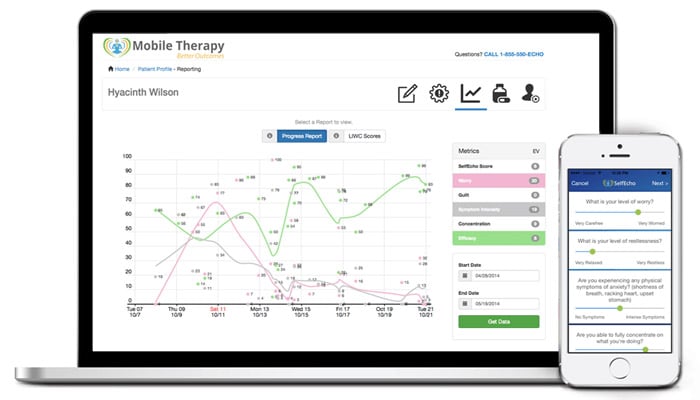SelfEcho launched a new service that allows mental health clinicians to “go mobile.” Called Mobile Therapy, the mobile and web-based platform collects client data via smartphone sensors and experience sampling to improve care. The system provides clinicians with the ability to charge clients for the concierge-style service of using Mobile Therapy and its intervention features through an integrated payment option built into the app. The goal of the platform is to empower clinicians with the data they need to treat patients, rather than “prescribing” mental health care treatment or advice within the app.
“Now, Mobile Therapy gives clinicians new psychology tools to not only better understand what is going on in their clients’ lives, but also to intervene when needed in order to improve treatment and outcomes,” said Daniel Gilbert, a professor of psychology at Harvard University and senior scientific advisor for SelfEcho, developer of Mobile Therapy.
SelfEcho’s HIPAA-compliant service costs $50 per month or $480 per year for unlimited number of clients.Clinicians can customize Mobile Therapy’s intervention feature to suit the needs of the client. For example, if a client is being treated for anxiety, the clinician can set an alert to notify them if their client’s metrics indicate an elevated level of anxiety based on their median average. At any time, they can view metrics from Mobile Therapy’s centralized dashboard to more efficiently diagnose, empirically track patient progress, identify triggers and make more informed decisions about treatment planning.
The data collected is analyzed by psychology-based algorithms, based on the linguistic analysis technology LIWC, which itself based on 20 years of research stemming from Professor James W. Pennebaker’s work at the University of Texas at Austin.
SelfEcho‘s service is HIPAA compliant, supporting iPhone and Android devices. It costs $50 per month or $480 per year for unlimited number of clients. A free 30-day trial is available.
According to a national survey commissioned by SelfEcho, mental health practitioners believe mobile apps geared to mental healthcare treatment have the ability to improve patient care and practice management. 66% of survey respondents believe that being able to obtain additional data on clients using mobile technology would improve their ability to treat them. Furthermore, 68% of clinicians surveyed felt that integrating additional data from apps for mental health tracking into therapy practices would help clinicians advance their profession.


